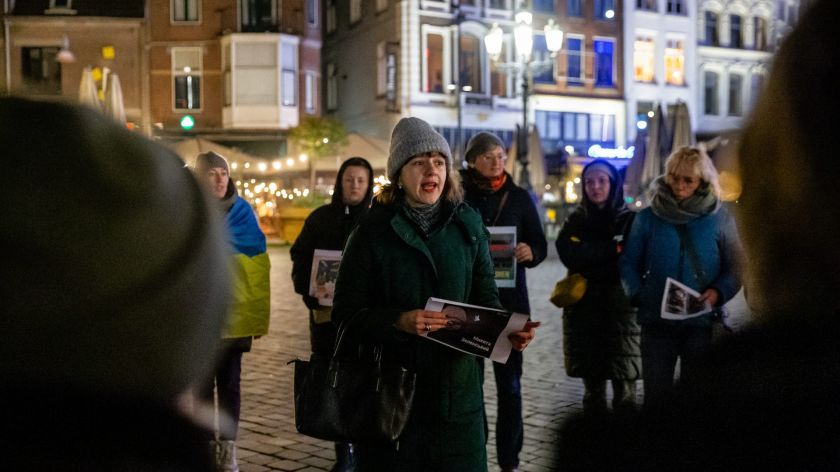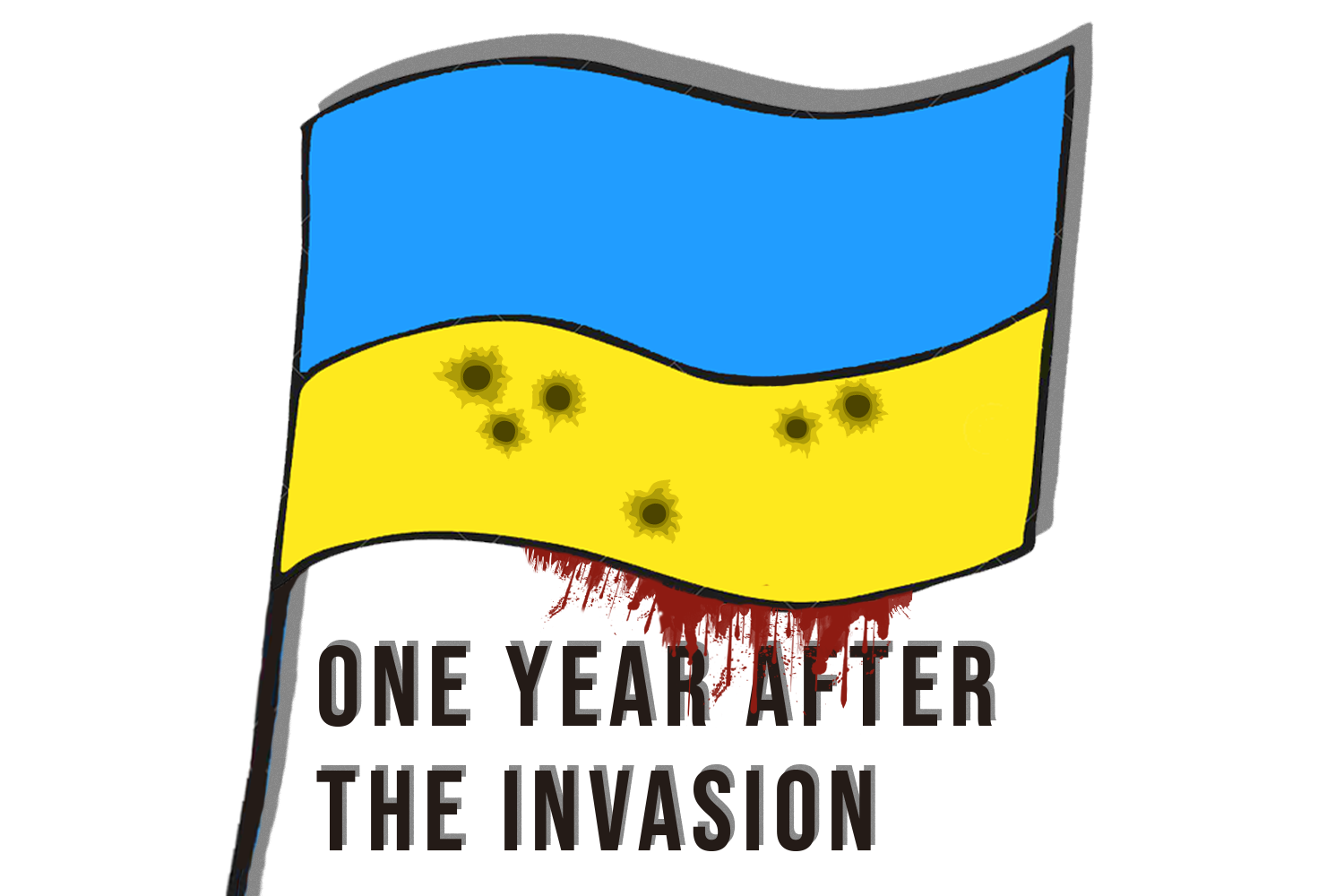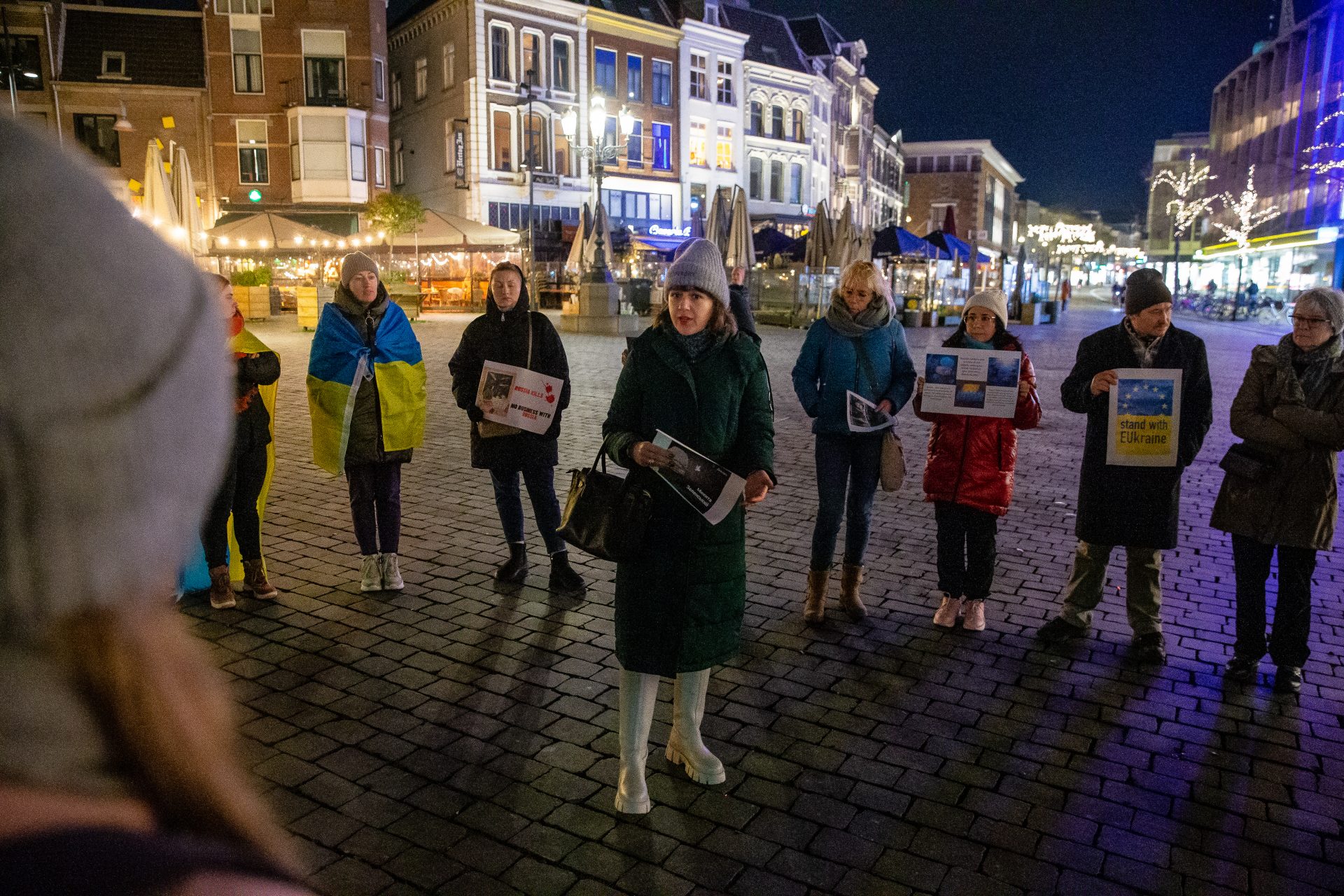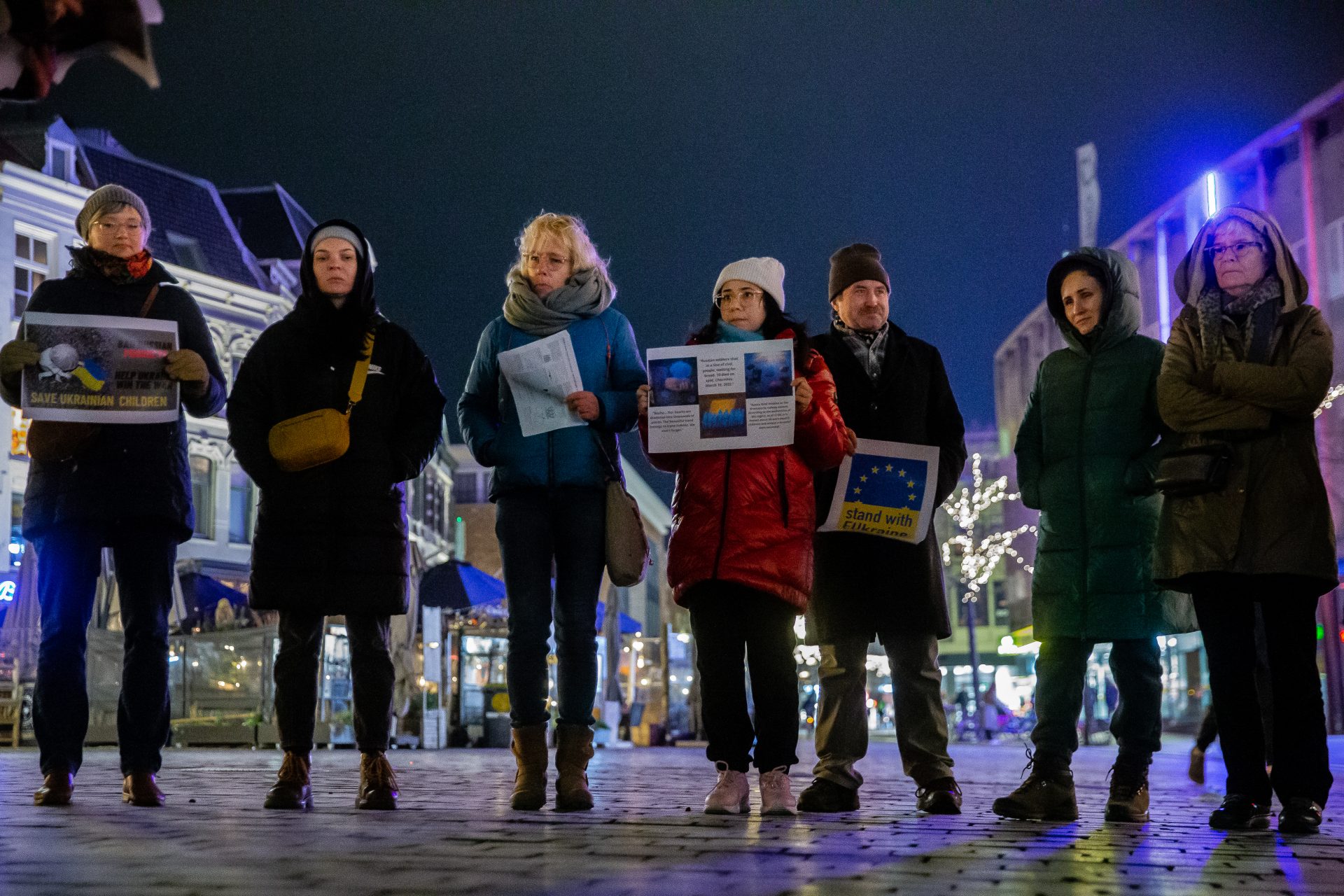One year after the invasion (3): the Ukrainian Liliya keeps demonstrating against the war
-
 Photo: David van Haren
Photo: David van Haren
Since Russia's invasion of Ukraine one year ago, Liliya Levandovska, together with her friends, has organised more than 30 demonstrations in Nijmegen. She calls her mother and grandmother, who live in western Ukraine, every day. 'Sometimes I think I should be there and hear the air alarm myself.'
Around 35 people, mostly women and children holding Ukrainian flags, have gathered in a large circle on the Grote Markt (large square in the city centre, ed.) in Nijmegen. Many of them speak Ukrainian, but there are also bits and pieces of English and Dutch. It’s dark outside on this Monday evening in January, and cold winds crawl under the scarfs and coats of the demonstrators. Whenever someone sighs that it is cold, one of the protesters replies that ‘our boys’ at the front lines must feel even colder.
Mykyta
It’s 6 pm when Liliya Levandovska (40) steps into the centre of the circle, addressing the crowd in English. The Ukrainian grant advisor at Radboud University is holding a picture of a baby in her hands, showing it to everyone in the circle. It is one of the victims of a recent rocket attack on an apartment building in Dnipro, which killed at least 40 people.
One year after the invasion
On 24 February, it is exactly one year ago that Russia invaded their neighbouring country Ukraine. In a series of articles on Vox, students and employees talk about how the war has become a part of their life.
‘The mother of this baby, who is deaf and mute, was under the debris for over 30 hours’, she says. ‘Despite her handicap, she managed to make enough noise so she could be rescued. The first thing she asked after her rescue was how her husband and baby were doing. The people in the hospital did not immediately dare to tell her that both had died during the bombardment. The baby was less than a year old.’
‘Remember his name: Mykyta’, says Liliya as she shows the picture to the attendees for a second time. Except for a few students cycling by, the square is silent. ‘As long as the war lingers on, this happens every single day.’
Missing
The idea for Nijmegen4Ukraine originated in the centre of Nijmegen, Liliya says a week later in a small room on campus. On the 24th of February, the day Russia invaded neighbouring Ukraine from several locations, she decided to meet a Ukrainian girl. ‘We simply informed the media that we would be standing at the Grote Markt as a form of protest. A few days later, we organised the first rally together. More than a hundred people attended, Dutch and from other countries, including students from Ukraine.’
Since that first time, the protesters have gathered some 30 times on the Grote Markt or at Mariënburg (another square in the city centre, ed.). Also, more than ten vans of help needed in the first months of the war were sent to Ukraine through calls for donations.
In the beginning, the group met every day. After a while, it became once a week, and currently: once a month. ‘The idea is to give a first-hand account of what is happening in Ukraine. Whenever a Ukrainian soldier is interviewed on Dutch television, half of what he says is not translated. Out of ten spoken sentences, two make it into the subtitles.’
On social media, Levandovska reads more and more reports of young people who have died or gone missing. ‘There are thousands of them’, she says. ‘Sometimes, I just can’t take it anymore. It’s very sad. Dutch media often only talks about the numbers as abstract statistics, while the personal stories of loss are absolutely tragic to read.’
Ukrainian refugees were regular attendees of the protests, says Levandovska. ‘I then acted as an interpreter. One of them told me that her brother was fighting. Another woman’s brother had been missing for more than five months.’
Air alert
Russia’s large-scale invasion of Ukraine has now been going on for almost a year. On the 23rd of February, the night before the invasion, her neighbours were visiting, Levandovska recalls. ‘I remember telling them that I would like to visit my family and friends in Ukraine again, but that it might not happen soon, given the presence of Russian soldiers at our borders.’
When she woke up the next morning, she had a lot of messages from friends who expressed their sympathies. Levandovska immediately knew what had happened. ‘I ran to my husband and daughter to tell them that the war had started. On the news, I watched my native land being under fire. I immediately called my mother. She hadn’t wanted to call me in the middle of the night because she didn’t want to disturb me. She wanted me to read the news first.’
How is your family doing?
‘My mother and grandmother live in Ivano-Frankivsk, a town in the west of the country. They fled to the Netherlands in March – on the day they left, the airport in the town was attacked, and the air alert forced them to take shelter in the car for a while. They stayed with us until June, but, at some point, my grandmother wanted to return to Ukraine. She is already quite old, and she missed her daily routine.’
‘The war has crept into my daily routine’
Do you know many people on the front lines?
‘A lot of my friends and acquaintances are fighting there, including some of my former classmates. One of them sings in a famous Ukrainian rock band. I am occasionally in contact with them. I want to stay in the loop. What does the army need? Has there been a rocket attack somewhere? I donate regularly to different organisations.’
How has the war changed your life?
‘My life is now defined by the war and the war has crept into my daily routine. When I wake up, I check the news and call my mother. She is often without electricity, so it sometimes takes a while for her to answer. Then I always get very worried. I feel the urge to check the news every few hours. I feel guilty if I don’t as I also need to pass the latest information to other people when I am asked questions about Ukraine.’
Euromaidan
Levandovska lived in Kyiv until 2009. She worked at the Institute for Euro-Atlantic Cooperation, where she tried to convince her compatriots of the need for Ukraine’s integration into the European Union and NATO. ‘There was a lot of miscommunication about that so we organised conferences on the subject’, she says.
Levandovska decided to leave Kyiv and eventually moved to Budapest. In the Hungarian capital, she worked as a researcher for the Central European University and for a company dedicated to obtaining research projects and matching grants from the European Union.
But even in Hungary, the politics of her homeland never let her go. When Euromaidan protests broke out in Kyiv in late 2013 because President Viktor Yanukovych refused to sign a political and trade treaty with the European Union, Levandovska organised protests in Budapest, where, just like in Nijmegen last year, she addressed the crowd. ‘Somehow I felt like I had to do this’, she says.
On the recommendation of a former colleague who moved to the Netherlands, Levandovska applied for a vacancy at Radboud University. She got hired and has now been working as a grant advisor for three years. Here, she helps researchers apply for European grants. ‘I am very happy with our move to the Netherlands’, says Levandovska. ‘I like the Dutch openness. You can always be sure that people will say what they think, in a respectful way.’
What do you miss most about Ukraine?
‘My family, my friends – and Kyiv. It’s a special city, there has always been a great sense of freedom and independence.’
Would you want to return to Ukraine as long as there is war?
‘I think about this a lot. Sometimes a feeling that I should be going creeps up on me. That I should be there and hear the air alarm myself. That I should see the bombed cities with my own eyes. However, I also know of people who went back to Ukraine and lost their lives. You never know where the missiles will hit. Besides that, I wouldn’t want to go without my daughter, but taking her with me is out of the question at the moment. I’d rather go there to celebrate the Ukrainian victory.’
Back to the Grote Markt. Liliya concludes the rally with a political statement. She asks the Dutch audience to put pressure on their government so that support continues as long as it’s needed, because Russia must be stopped. She disagrees with Germany’s argument for not supplying tanks to Ukraine because they don’t want things to escalate. Liliya says: ‘It is Russia that is escalating things, it escalated a long time ago. If you do nothing, other countries like the Baltic states and Poland might also get attacked by Russia. And that is why these countries, knowing Russia very well, are strongly supporting all possible military aid for Ukraine.’ She keeps calling the Russians terrorists and makes a comparison with a hundred years ago when the Soviet Union occupied Ukraine. ‘It’s always the same’, she says.
Has your opinion on Russians changed in the past year?
‘No, and I would like to explain why. Passing through generations, everyone who grows up in Ukraine hears true family stories about the consequences of Russian occupation. That is why the Russian attack was not a surprise. My maternal grandparents lost all property to the Russian Red Army and my paternal grandparents lost their farm. The brother of my grandmother died in Siberia, because he was captured by Russian soldiers who came to Ukraine. These stories are passed down.’
‘When I tell my colleagues about this, they are surprised, though now they are gaining more understanding. At the beginning of the war, you would hear occasional calls for Russians to protest against the war. I knew they would never do that on a large scale. Nowhere did Russians abroad who already lived there and those who escaped mobilization, go to their embassy to protest.’
Maybe they don’t want to protest out of fear that something might happen to their families?
‘That seems naïve to me. Maybe they won’t protest because they support the war, or because they just don’t care. European media often looks for good Russians. Take for example Aleksey Navalny (Russian lawyer and activist, ed.). He has said in the past that Crimea would not belong to Ukraine again, as it’s not a sandwich to pass around. Some members of his party are also fighting in Ukraine against Ukrainians.’
You work as a grant adviser. Would you help a Russian scientist at Radboud University?
‘Yes, provided he does not openly support the war.’
What do you think of the attitude of the European Union and the Netherlands towards the war?
‘I appreciate the support and the clear position of the EU and the Netherlands. There has been a lot of ambiguity over the past decade, even though the Russian war has already been ongoing: as recently as 2018, the construction of Nord Stream 2 (pipeline transporting Russian natural gas to Germany, ed.) was underway. Now the EU has cut ties with Russia and strict sanctions are increasing in number. Such a clear stance has an impact on public opinion in Europe and I see a lot of support for the restrictions imposed on Russia. At the same time, I also think that military aid in general could come faster. With every day of countries hesitating about sending equipment, more people die.’
‘If you don’t send military equipment, the Russians wil continue’
Levandovska watches Dutch television regularly. A while ago, she heard on a talk show that sending more military equipment to Ukraine would lead to more escalation. ‘In my opinion, the opposite is the case’, she says. ‘If you don’t send anything, the Russians will continue. And they will not stop at the Polish border. That’s why it’s so important that there is continuous support from politicians, and that EU citizens continue to support these measures.’
That’s why you keep organising Nijmegen4Ukraine?
‘Exactly. So that Dutch people continue their support for the sanctions and other measures, while understanding why they are necessary. I want people to continue being aware that a war is happening: our soldiers and innocent civilians, including children, are dying every day, while they could just be living their lives, like you and me.’
The next meeting of Nijmegen4Ukraine takes place on the 24th of February. During this meeting, not only one year of invasion will be commemorated, but also the nine years since Russia occupied Crimea and started the war.
Translated by Jan Scholten.






